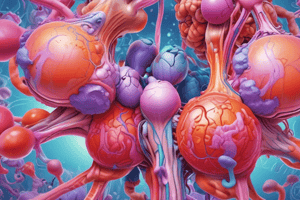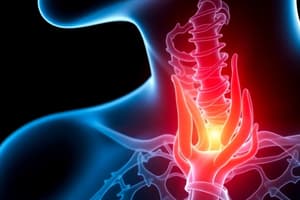Podcast
Questions and Answers
Which symptom is specifically associated with hyperthyroidism?
Which symptom is specifically associated with hyperthyroidism?
- Hair loss
- Cold intolerance
- Weight gain
- Exophthalmos (correct)
What is the primary mechanism of action of Methimazole?
What is the primary mechanism of action of Methimazole?
- Inhibits synthesis of thyroid hormone (correct)
- Inhibits absorption of iodine
- Blocks thyroid hormone receptors
- Stimulates growth of thyroid tissue
What is a common non-specific sign of jaundice?
What is a common non-specific sign of jaundice?
- Flu-like symptoms
- Swelling in extremities
- Skin rash
- Yellowing of skin and eyes (correct)
What is the treatment option for hypothyroidism?
What is the treatment option for hypothyroidism?
Which condition is characterized by an extremely low number of granulocytes?
Which condition is characterized by an extremely low number of granulocytes?
What is a common symptom of excessively elevated thyroid hormones?
What is a common symptom of excessively elevated thyroid hormones?
In the management of hyperthyroidism, what monitoring is particularly important for Methimazole therapy?
In the management of hyperthyroidism, what monitoring is particularly important for Methimazole therapy?
Which symptom would NOT be associated with hyperthyroidism?
Which symptom would NOT be associated with hyperthyroidism?
What are the two primary thyroid hormones produced by the thyroid gland?
What are the two primary thyroid hormones produced by the thyroid gland?
What is the main role of thyroid hormones in the body?
What is the main role of thyroid hormones in the body?
Which compound is essential for the synthesis of thyroid hormones?
Which compound is essential for the synthesis of thyroid hormones?
The most common cause of hyperthyroidism is which of the following conditions?
The most common cause of hyperthyroidism is which of the following conditions?
Which autoimmune disease is characterized as Grave’s disease?
Which autoimmune disease is characterized as Grave’s disease?
What is exophthalmos associated with?
What is exophthalmos associated with?
What is the prototype medication used to manage hyperthyroidism?
What is the prototype medication used to manage hyperthyroidism?
Which of the following side effects must a patient taking levothyroxine report to their healthcare provider?
Which of the following side effects must a patient taking levothyroxine report to their healthcare provider?
Flashcards are hidden until you start studying
Study Notes
Endocrine System Overview
- Thyroid gland is not palpable.
- Thyroid hormone is produced by the thyroid gland.
- Two primary hormones: Triiodothyronine (T3) and Thyroxine (T4).
- Main functions of thyroid hormone: regulates metabolism, heart rate, cardiac output, promotes growth and development, supports brain maturation in fetal and early postnatal life.
- Signs and symptoms of thyroid disease primarily affect metabolism and cardiac function.
- Iodine is a necessary compound for thyroid hormone synthesis.
Hyperthyroidism
- Most common cause: Graves' disease, an autoimmune disorder.
- Pathophysiology: Immunoglobulins stimulate thyroid-stimulating hormone receptors, leading to increased hormone synthesis.
- Exophthalmos: Condition characterized by protruding eyeballs due to fluid accumulation and tissue buildup.
- Common signs/symptoms: Weight loss, diarrhea, heat intolerance, nervousness, sweating, hyperexcitability, tachycardia, palpitations, and exophthalmos.
- Treatment options: Thyroidectomy or radioactive iodine therapy.
- Prototype medication: Methimazole (Tapazole), suffix -mazole.
- Mechanism of action for Methimazole: Inhibits thyroid hormone synthesis.
- Effectiveness of Methimazole is indicated by the reduction of hyperthyroid symptoms (e.g., bradycardia from tachycardia).
- Risks of overtreatment: Extreme hypothyroidism signs, fever, rash, and leukopenia due to agranulocytosis.
- Agranulocytosis is life-threatening with low granulocytes, increasing infection risk, and potentially low RBCs and platelets.
- Regular checks while on Methimazole: CBC and hepatic function, as Methimazole can be hepatotoxic.
Jaundice
- Jaundice is a sign of hepatic failure or injury associated with elevated bilirubin levels, leading to yellow discoloration of skin, mucous membranes, and sclera.
- Assessing jaundice should always focus on the sclera.
Hypothyroidism
- Most common cause: Autoimmune condition known as Hashimoto’s thyroiditis.
- Pathophysiology: Antibodies attack the thyroid gland, leading to fibrotic and non-functional tissue, resulting in decreased hormone production.
- Treatment medication: Levothyroxine (Synthroid).
- Mechanism of action: Synthetic T4 is converted to active T3 in peripheral tissues, correcting hypothyroidism.
- Administration route: Oral (PO) or intravenous (IV).
- Signs of effective treatment: Increased metabolic rate.
- Possible side effects: Tachycardia, palpitations, dysrhythmias, severe angina, nervousness, tremors, anxiety, insomnia.
- Important side effect to report: Any signs indicative of adverse reactions to levothyroxine.
Studying That Suits You
Use AI to generate personalized quizzes and flashcards to suit your learning preferences.




